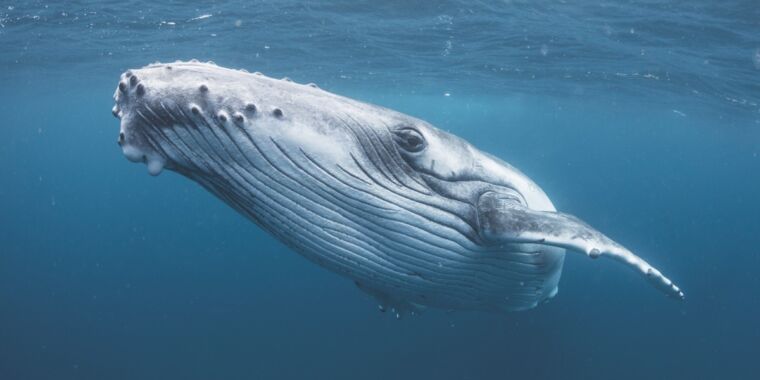Hebrides OvertureThe disappearing nuts highlight the fate of humpback whales.
Felix Mendelssohn’s the Hebrides was inspired by the composer’s journey to the British Isles in 1829. His overture now inspired a collaboration between a Cambridge economist and a composer, using sound to draw attention to the loss of Earth’s biodiversity. Hebrides edited sequentially removes notes from the 10 to 11 minute overture in proportion to the decline in humpback whale populations over many decades. A short film about the project (embedded above) was released today as part of the Cambridge Zero Climate Change Festival.
“Over the past century, we’ve seen nearly a million species pushed to the brink of extinction — nature goes quiet,” said Matthew Agarwala, an economist at the University of Cambridge. “Researchers, myself included, have been sounding the alarm about the consequences of biodiversity loss for a long time, but the message is not getting through. Music is deep-rooted and emotional, drawing people’s attention in ways scientific papers can’t.”
Mendelssohn visited England and Scotland at the invitation of the Philharmonic Society. It was during his tour of Fingal’s Cave on the Scottish island of Staffa that inspiration struck and he quickly wrote down the opening theme that came to mind. The opening notes feature violas, cellos and bassoons to evoke the beauty of the cave, while a secondary theme is meant to convey the rolling waves of the sea.
He completed the piece in June 1832 and conducted the first performance in January 1833 in Berlin. It is widely regarded as one of his greatest compositions, sometimes described as a tone poem. None other than Johannes Brahms once stated, “I would gladly give all I have written to have composed something like the Hebrides overture.”
Per Agarwala, there are about 30,000 notes in Mendelssohn’s original score, roughly equivalent to the number of humpback whales that populated the oceans in 1829. But a booming whaling industry pushed their numbers to the brink of extinction. By the 1960s, there were only about 5,000 humpback whales left, and the International Whaling Commission (IWC) banned commercial humpback whale fishing as a protective measure.
Ewan Campbell
The species has since recovered, with a global population of about 135,000 whales in 2018, 13,000 of which call the North Atlantic home. But they still face threats such as becoming entangled in fishing gear, colliding with ships and excessive ocean noise, as well as the destruction of their coastal habitats and adverse effects of climate change.
That’s why Agarwala and composer Ewan Campbell chose to build Hebrides edited around the plight of those creatures, assuming it was very likely that Mendelssohn would have seen a humpback whale or two or hundreds during his journey. Campbell divided the score into sections to represent decades, gradually removing notes based on how whale populations declined during those decades. Still, the piece ends optimistically, with whale populations increasing by 8 percent every decade going forward.
“At its lowest point, the score is thin and fragmented, with isolated notes reaching for a tune that’s only partially present,” Campbell said. “But even in devastating destruction, nature is resilient and ever beautiful, and so even when two-thirds of the music is absent, there is still a delicate beauty, though a pale imitation of the once dramatic glory. ‘Editorial’ is a word which is normally associated with censorship and the silencing of history. I think it is very appropriate for this piece of music. We show how human activities have silenced nature.”
Hebrides edited received a standing ovation when performed by a 38-piece orchestra at the August Wilderness Festival in Oxfordshire, England, with Campbell as conductor and Agarwala as narrator.

